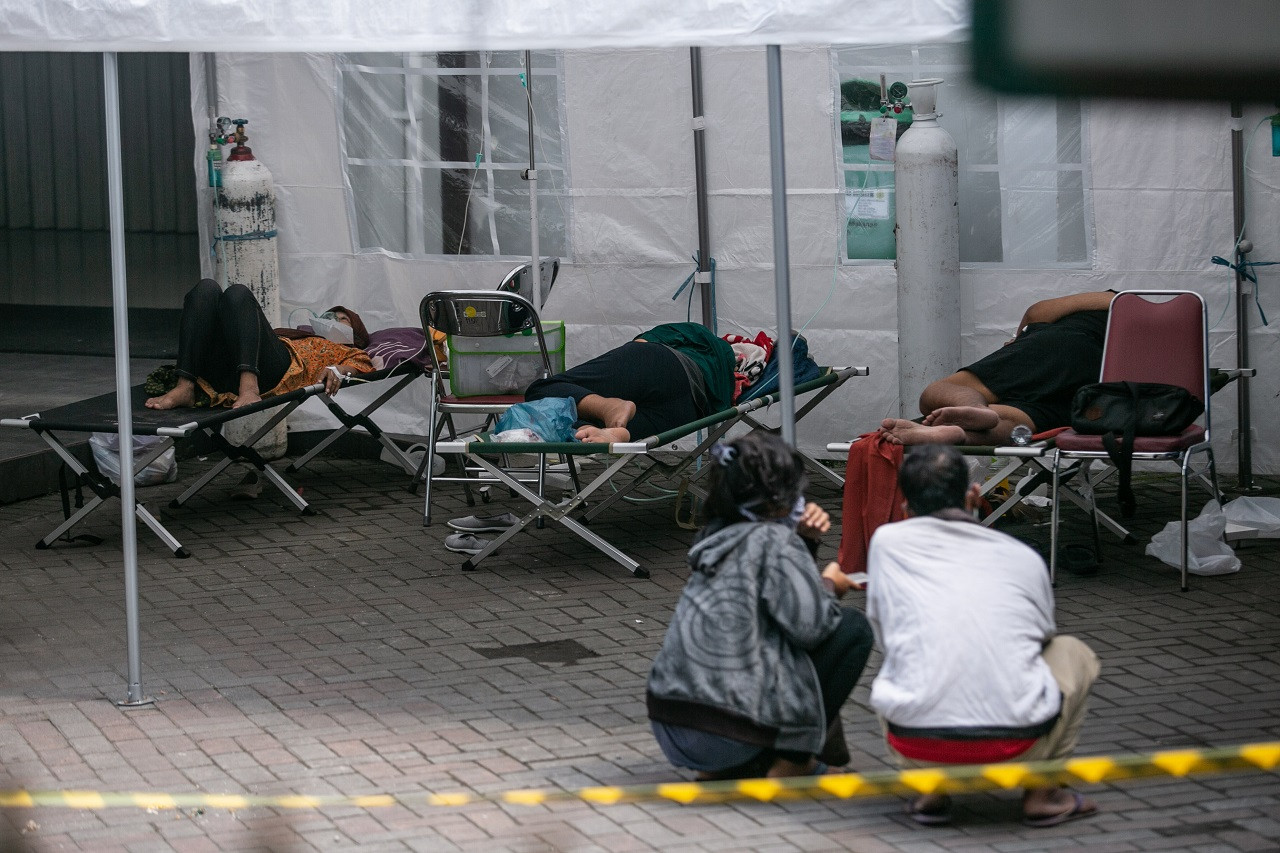Popular Reads
Top Results
Can't find what you're looking for?
View all search resultsPopular Reads
Top Results
Can't find what you're looking for?
View all search resultsMore aid arrives in RI as Australia records first death in Sydney
Asia Pacific countries continue to battle Delta variant-fueled case surge
Change text size
Gift Premium Articles
to Anyone
I
ndonesia is continuing to receive international assistance during its worst COVID-19 surge yet, with the latest batch of aid, 1,000 ventilators from Australia, arriving late on Friday.
Australia will also be sending 2.5 million vaccine doses, oxygen concentrators, oxygen cylinders, antigen test kits and other medical equipment in stages, the Indonesian Foreign Ministry has announced.
“Cooperation and collaboration are key to dealing with the developments in the increase of COVID-19 cases and deaths that have occurred in various regions of the world as a result of this new variant,” the Foreign Ministry wrote in a statement on Saturday.
Earlier on Friday, Singapore delivered 200 ventilators, 250 empty oxygen cylinders, 30 oxygen concentrators and a number of other pieces of medical equipment to Indonesia. In addition to the aid, Indonesia has purchased 10,000 oxygen concentrators from Singapore, 30 of which arrived on Friday alongside the assistance.
Read also: Indonesia accepts foreign aid amid struggle to contain virus
Singaporean Foreign Minister Vivian Balakrishnan said that over the course of the pandemic, the two countries had helped each other, including when Indonesia had supplied essential equipment for Singapore’s community care facilities last year.
“Now, at their point of need, we stand in solidarity with them. It is this kind of mutual support that represents the strength of our relationship – not just at the government-to-government level but also at the people-to-people level,” he said.
After a week of record breaking new daily cases, peaking at more than 38,000 on Thursday and Friday, Indonesia is visibly struggling to mitigate its worst spate of infections since the start of the pandemic.
The situation has drawn the sympathy of the international community, with countries lining up to send much-needed relief in the form of medical supplies, equipment and COVID-19 vaccines.
A week ago, the country received a shipment of nearly 1 million AstraZeneca vaccine doses from Japan, while the United States recently announced it would be sending 4 million Moderna vaccine doses to Indonesia under the COVAX global equitable distribution initiative.
Meanwhile, Australia is also struggling to bring the Delta variant under control, announcing its first coronavirus-related death in the current Sydney virus outbreak on Sunday.
A woman in her 90s died on Saturday, hours after testing positive for COVID-19, and was also the first death from a locally acquired infection in Australia this year.
It came as authorities announced a record 77 new cases and warned that numbers were expected to spike above 100 on Monday.
“Tomorrow and the few days afterward will be worse, much worse than we’ve seen today,” New South Wales State Premier Gladys Berejiklian said, as quoted by AFP.
Sydney is now in its third week of lockdown, but the number of new cases continues to grow among a population that is overwhelmingly unvaccinated.
Lockdown rules were tightened on Friday and Berejiklian warned that stay-at-home orders were expected to remain in place unless there was a dramatic turnaround.
“Given where we’re at and given the lockdown was supposed to be lifted on Friday, everybody can tell it’s highly unlikely at this stage, given where the numbers are,” she said.
Sydney has recorded 566 new infections since the beginning of the outbreak in mid-June. While that is low compared to most global cities, Australia has taken a zero-tolerance approach to widespread community transmission throughout the pandemic.
The government launched a new advertising campaign Sunday encouraging people to “arm yourself” against COVID-19 by getting jabbed, though vaccines are yet to be offered to most under-40s.
Australia has recorded just over 31,000 cases of COVID-19 and 911 deaths in a population of about 25 million to date.
In Bangkok, Thailand, the country’s Health Ministry said on Sunday more than 600 medical workers who received two doses of China’s Sinovac vaccine had been infected with COVID-19, as authorities weigh giving booster doses to raise immunity.
Of the 677,348 medical personnel who received two doses of Sinovac, 618 became infected, Health Ministry data from April to July showed. A nurse has died and another medical worker is in critical condition.
An expert panel has recommended a third dose to trigger immunity for medical workers who are at risk, senior health official Sopon Iamsirithawon told a news briefing on Sunday.
“This will be a different vaccine, either viral vector AstraZeneca or an mRNA vaccine, which Thailand will be receiving in the near term,” he said as quoted by Reuters.
Thailand has reported a total of 336,371 confirmed infections and 2,711 fatalities since the pandemic began last year.
The majority of Thailand’s medical and frontline workers were given Sinovac shots after February with the viral vector vaccine from AstraZeneca arriving in June.










